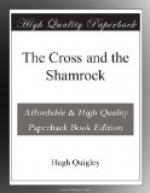Sadly did the mysterious miscarriage of his letters puzzle the ingenuous heart of poor Paul; though he had reason to suspect, from certain hints thrown out by Amanda, that she, somehow or other, was in possession of their contents. On a certain day, however, a circumstance convinced Paul that he could not now expect an answer from his letters to Father O’Shane; for Miss Amanda had just pointed out to him a paragraph in the newspaper stating that the Catholic priest of T—— had died of ship fever, taken by him in the discharge of his duties among the sick of his flock.
“God rest his soul,” said Paul, raising his eyes to heaven; “he was a good friend to us in our hour of need.”
“What’s that you say, Paul?” said Amanda, with a frown. “Did I not tell you repeatedly, Paul, that it was useless to pray for the dead?”
“I know you told me that often, ’Mandy; but am I bound to believe you, when I know the church teaches me the contrary? In fact, the Bible says it is ’a holy and a wholesome thought to pray for the dead, that they may be loosed from their sins.’” (Mac. xii. 42.)
“Don’t you call me ’Mandy, Paul,” said the vain old maid; “my name is Miss A-man-day.”
“A-man-a-day,” said Paul, with a sarcastic smile. “I beg pardon,” said he, “miss; I must guard against that blunder in future, and say A-man-a-day.”
“Ah, you naughty boy!” she said, catching him by the hand. “Come here to me till I teach you the knowledge of God’s word. Now, Paul, that passage you quoted I do not find in my Bible.”
“No,” said Paul, “for your Bible is no other than an imperfect, mutilated Bible, corrupted by the men who made your religion. The Catholic church, from which the Protestants stole their piecemeal Bible, always regarded the book of Machabeus as the inspired word of God.”
“But, Paul, it is so foolish, this ‘half-way house.’”
“Then, miss, you must blame God, who created it, for the folly of his not consulting with some Protestant philosopher before he created such a ‘half way.’ For most certainly there was always, since the dawn of creation, a third place; as, for example, the place where the souls of the just were confined before Christ, who was the first to ascend into heaven, as himself says in his gospel. Now, the Bible does not say that this half way was ‘foolish,’ or abolished either. Besides, it is but reasonable that there should be a place to purify the frail and imperfect soul before admitting her to God’s holy presence.”




